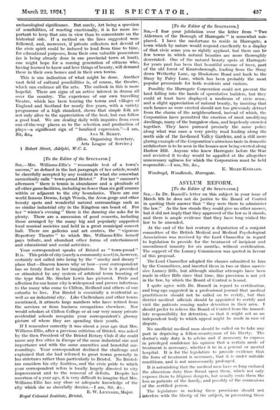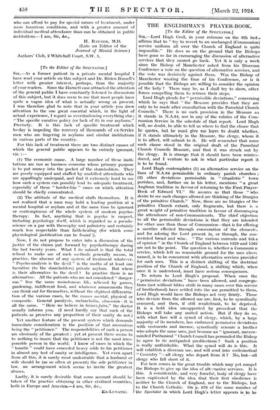ASYLUM REFORM.
[To the Editor of the SPECTATOR.]
Snt,—In Dr. Russell's letter on this subject in your issue of March 8th he does not do justice to the Board of Control in quoting their answer that " they were there to administer the law." As the law stands they could give no other answer, but it did not imply that they approved of the law as it stands, and there is ample evidence that they have long wished the law to be amended.
At the end of the last century a deputation of a conjoint committee of the British Medical and Medical Psychological Associations was received by the Lord Chancellor in regard to legislation to provide for the treatment of incipient and unconfirmed insanity for six months, without certification. The support of the Lunacy Commission was quoted in favour of this proposal.
The Lord Chancellor adopted the clauses submitted to him by the Committees, and inserted them in two or three succes- sive Lunacy Bills, but although similiar attempts have been made in other Bills since that time, this provision is not yet in the law, by which the Board of Control is bound.
I quite agree with Dr. Russell in regard to certification, and long ago suggested in a professional journal that medical practitioners should not be called on to certify, but that district medical officials should be appointed to certify and visit the patients coming under detention in their area. I should prefer to relieve the Board of Control from the immed- iate responsibility for detention, so that it might act as an independent body to which appeal might be made in case of dispute.
No unofficial medical man should be called on to take any part in depriving a fellow-countryman of his liberty. The doctor's only duty is to advise and if necessary to express in privileged confidence his opinion that a certain mode of treatment is necessary, whether it be in a general or mental hospital. It is for the legislature to provide evidence that the form of treatment is necessary, that it is under suitable conditions, and is not unnecessarily prolonged.
It is astonishing that the medical men have so long endured the obnoxious duty thus thrust upon them, which not only exposes them to litigious dangers, but usually costs them the loss as patients of the family, and possibly of the connexions of the certified person.
The legislature in making these provisions should not interfere with the liberty of the subject, in preventing those who can afford to pay for special means of treatment, under more luxurious conditions, and with a greater amount of individual medical attendance than can be obtained in public institutions.—I am, Sir, &c.,
H. RAYNER, M.D.
(Late an Editor of the Journal of Mental Science.) Authors' Club, 2 Whitehall Court, S.W. 1.















































 Previous page
Previous page